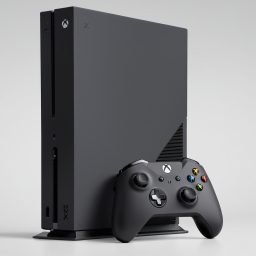Predictions on Next-Generation Consoles and the Industry Landscape
The gaming industry is on the cusp of a transformative era, driven by rapid technological advancements, shifting consumer preferences, and strategic manoeuvres by major players. As we look towards the future, several key trends and predictions emerge, particularly regarding the next generation of consoles, the potential abandonment of physical media, and the evolving dynamics of the Console vs. PC war.
The Next-Generation Consoles
Sony and Microsoft continue to lead the charge in the console market. The next-generation PlayStation and Xbox consoles are anticipated to build on the successes and lessons of their predecessors, focusing heavily on performance, immersive experiences, and integration with broader entertainment ecosystems.
- Performance and Immersion: Expect significant upgrades in processing power and graphics capabilities, potentially leveraging advanced AI and machine learning to enhance in-game environments and character behaviours. Real-time ray tracing, already a hallmark of current-gen consoles, will likely become even more sophisticated, delivering unprecedented levels of realism.
- VR and AR Integration: Virtual reality (VR) and augmented reality (AR) are expected to play a more prominent role. Sony’s continued investment in PSVR suggests that the PlayStation 6 will offer enhanced VR experiences, while Xbox might collaborate with AR technology, building on Microsoft’s HoloLens innovations.
- Cloud Gaming: Both consoles will likely deepen their integration with cloud gaming services. Microsoft’s xCloud and Sony’s PlayStation Now are set to expand, offering seamless game streaming experiences that reduce the dependency on powerful local hardware.
The recently announced successor to the Nintendo Switch is poised to continue the hybrid console’s legacy of versatility and innovation. Key predictions for the Switch 2 include:
- Enhanced Portability: Improved battery life, lighter design, and a more robust build will make gaming on the go even more accessible and enjoyable.
- Performance Boost: While Nintendo traditionally prioritizes gameplay innovation over raw power, the Switch 2 is expected to feature significant hardware upgrades, possibly incorporating custom Nvidia GPUs to support higher resolutions and more detailed graphics.
- Expanded Online Services: Building on the success of Nintendo Switch Online, the next console will likely offer more comprehensive online features, including expanded cloud saves, better multiplayer support, and possibly a broader range of classic games available through a subscription service.
The Potential Abandonment of Physical Media
The shift towards digital distribution has been accelerating, and the next generation of consoles might mark a tipping point where physical media becomes a rarity. Several factors contribute to this trend:
- Convenience and Instant Access: Digital games offer instant access without the need for physical storage or trips to a retail store. This convenience is highly appealing to modern gamers.
- Cost Efficiency: Digital distribution eliminates manufacturing, packaging, and shipping costs, potentially allowing for more competitive pricing and higher profit margins for publishers.
- Environmental Impact: Reducing the production of physical media aligns with growing environmental concerns, as it cuts down on plastic use and electronic waste.
The Console vs. PC War
The traditional rivalry between consoles and PCs is evolving. Rather than a zero-sum game, we are witnessing a convergence where each platform borrows strengths from the other:
- Cross-Platform Play: More games are supporting cross-platform play, breaking down barriers between console and PC gamers. This trend fosters a more inclusive gaming community and offers players greater flexibility in how they play.
- Hardware Innovations: Consoles are becoming more PC-like in their architecture, with modular components and upgradable storage options. Conversely, PCs are adopting more user-friendly interfaces and living-room-friendly designs, blurring the lines between the two platforms.
- Exclusive Titles and Services: While exclusive titles remain a key battleground, services like Xbox Game Pass, which is available on both Xbox and PC, are redefining the competition. These services provide access to a vast library of games for a monthly fee, enhancing the value proposition for both platforms.
Xbox’s Strategic Shift
Microsoft’s strategy with the Xbox platform is particularly noteworthy. By embracing a more inclusive approach and making Xbox games available on other platforms, Microsoft aims to expand its ecosystem and dominate the gaming landscape:
- Game Pass Everywhere: Xbox Game Pass is central to this strategy. By offering Game Pass on PC, mobile devices, and even potentially competing consoles, Microsoft is positioning itself as the Netflix of gaming, where the platform is less important than the subscription service itself.
- Cloud Gaming Expansion: xCloud, Microsoft’s cloud gaming service, is integrated into Game Pass Ultimate, allowing players to stream games on various devices without the need for a console. This move is designed to capture gamers who prefer the flexibility of playing anywhere.
- Acquisitions and Exclusives: Microsoft’s acquisition of major studios like Bethesda demonstrates a commitment to bolstering its first-party lineup. While these games may still appear on other platforms, they are often included in Game Pass on day one, providing a compelling reason to join the Xbox ecosystem.
Conclusion
The future of gaming is characterized by greater integration, accessibility, and innovation. As Sony, Microsoft, and Nintendo prepare their next-generation consoles, we can expect more powerful and immersive gaming experiences. The shift towards digital media will continue, reducing the prevalence of physical game discs. Meanwhile, the console vs. PC war will evolve into a more collaborative landscape, with cross-platform play and shared services blurring the lines between traditional rivals. Microsoft’s strategic shift towards platform-agnostic gaming highlights a future where the ecosystem matters more than the hardware, potentially reshaping how we experience and access video games in the years to come.

